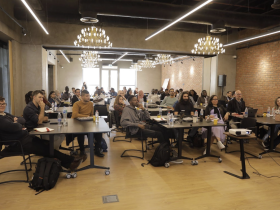During the 2020/2021 national lockdown, shopping behaviours and preferences changed. The lockdown resulted in an increase in online shopping, due to the health risks of visiting stores physically. Consumers became a lot more cautious about visiting brick and mortar stores, hence the huge shift to online shopping.
Suburban South African consumers have become more “digitally savvy”— making digital technology a part of their daily lives. The 2020 lockdown was a huge contributing factor to an increasing entry of first-time online shoppers. Therefore, South African retailers have been focusing their strategies towards investing more in the digital transformation of retail. Many South African retailers launched same-day delivery services which encouraged more consumers to choose online shopping.
However, the question then begs: “How can South African consumers from disadvantaged backgrounds fully adapt to the digital transformation of retail?”.
Digital transformation is designed for the more privileged sub-urban South African consumers who have data and internet access.
According to a research report on Marketing to the South African Consumer (2021), the average wage in South Africa is reported to be R3,500. This means the average South African household can barely afford typical basic needs. There are millions of South Africans who still do not have access to electricity. In view of the average household income in South Africa, retailers need to think about how many of their consumers from disadvantaged backgrounds can afford smart mobile devices to make online purchases? Therefore, it is crucial for South African retailers to understand the different market segments and inequality status of the country.
In this regard, retailers need to find innovative ways of making the digital transformation of retail more accessible to the average South African consumer. Innovative ways could include affordability of smart mobile devices and data costs. Retailers could also make the use of digital technologies more user friendly for consumers in underdeveloped communities. This would help create customer centricity and inclusivity within their organisations.
Enrol for a Bachelor of Commerce Degree in Retail Management at Mancosa should you be interested in gaining more knowledge on this topic and various other related aspects of the retail environment. The Retail Management Degree engages students to gain skills and knowledge relating to the functions and management of a retail business. The degree also engages students on the key issues associated with understanding retail trading and environments. Visit our website and campuses to find out more.
























Leave a Reply